MercoPress. South Atlantic News Agency
Tag: International Monetary Fund
-
Thursday, May 31st 2018 - 09:01 UTC
Argentine Senate votes 37 to 30 to freeze utility rates; Macri expected to veto the bill
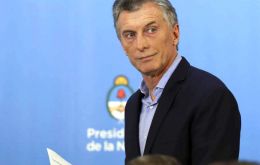
Following twelve hours of heated and at time acrimonious debate the Argentine Senate on early Thursday voted, 37 to 30, to freeze utility prices. President Mauricio Macri had anticipated that if the bill was passed he would veto it because there is no way the budget can stand an additional 1% of GDP deficit.
-
Tuesday, May 29th 2018 - 09:09 UTC
The Way Out of Argentina’s New Crisis

The late MIT economist Rüdiger Dornbusch used to tell his students in the 1980s that there are four kinds of countries: rich, poor, Japan, and Argentina. No one frets anymore about Japan buying its way to world domination. But the world is worrying again about Argentina.
-
Saturday, May 26th 2018 - 09:29 UTC
Protectionism the “darkest cloud” for the solid upswing of the global economy

The threat of trade protectionism is the biggest concern looming over a solid upswing in the global economy, IMF managing director Christine Lagarde said. The “darkest cloud” on the economic horizon is the “determination of some to actually rock the system that has actually presided over the trade relationships that we have all undertaken and enjoyed to some extent over the last many decades”, said Lagarde.
-
Saturday, May 26th 2018 - 09:11 UTC
IMF/Argentina discussions to stabilize the economy are “progressing well”

“We are really moving ahead and we have committed to President Macri that we will do the best we can in order to move expeditiously and efficiently in order to change the perception about Argentina and the perception that people have about our role,” Ms Lagarde said in Russia.
-
Sunday, May 20th 2018 - 13:15 UTC
Venezuela: Proselytism, pro-government advantage and hunger on the eve of the presidential election; the crisis gets worse
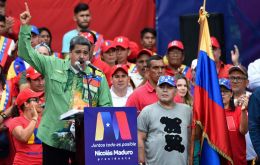
A few hours before the presidential election of May 20 in Venezuela, which is not recognized by dozens of countries in the region and is classified as “fraud” by the opposition of that country, official statements and messages favorable to the candidate and current president , Nicolás Maduro, have flooded the programs of the open media in Venezuela, according to a report by the Press Institute and Venezuela Society (IPYS).
-
Monday, May 14th 2018 - 08:20 UTC
The Economist: Will Argentina's woes spread?
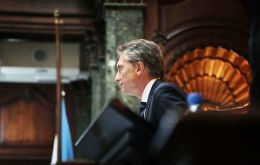
Argentina has much in common with yesterday's emerging markets, but little in common with today's
-
Wednesday, May 9th 2018 - 20:19 UTC
US Dollar rises: Uruguay behind Argentina
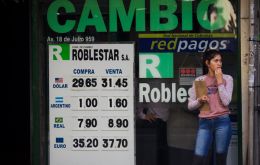
After several days up in Argentina, the devaluation of the Argentine peso and the rise of the US dollar have had some impact on the other side of the River Plate, where the exchange houses of downtown Montevideo marked on Wednesday the value of the currency up to 31,70 Uruguayan pesos per dollar, a rise of 2.08% compared to Monday —the highest in five years—. For the Uruguayan government, the country follows the global trend and calls for calm, beyond the noise generated in Argentina, which is beginning a dialogue between the Finance Minister, Nicolás Dujovne, and the International Monetary Fund (IMF) in Washington.
-
Tuesday, April 24th 2018 - 08:42 UTC
Brazil poised for historic oil boom

By Mathew Smith<br />
<br />
After being caught up in major corruption scandals and suffering from what some have claimed was its worst economic downturn in 100-years, Brazil has pulled itself back from the brink. The economy commenced growing again in 2017 with gross domestic product (GDP) expanding by 1 percent and 2018 GDP growth forecast by the International Monetary Fund (IMF) to be 2.3%. -
Tuesday, January 23rd 2018 - 09:23 UTC
Trump's tax reform prompts brighter outlook for global economy, says IMF
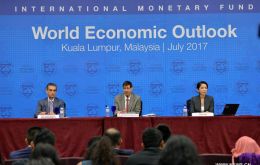
Prospects for the global economy are looking brighter, according to the International Monetary Fund (IMF), arguing that the recent pick-up has been pretty broad-based, particularly in Europe and Asia. Tax reforms in the United States are expected to stimulate economic activity, especially business investment.
-
Friday, January 19th 2018 - 09:27 UTC
Beijing claims economy growth picks up after seven years, but there are doubts about Chinese stats

China's economy grew by 6.9% in 2017 according to official data - the first time in seven years the pace of growth has picked up. The figure beats Beijing's official annual expansion target of about 6.5% and is good news for the global economy since China's impact and the better-than-expected data is likely to cheer investors around the world.
